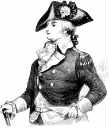 When the television is flipped on today, or the morning paper unfolded, or the website for CNN is opened on a browser, the stories that are most likely to come up first are political. Aside from the fact that it’s election time right now, stories featuring political issues and figures are a common sight in the news.
When the television is flipped on today, or the morning paper unfolded, or the website for CNN is opened on a browser, the stories that are most likely to come up first are political. Aside from the fact that it’s election time right now, stories featuring political issues and figures are a common sight in the news.
In fact, the newspaper (in the sense of the news entity) has always kept the government accountable for its actions by keeping the public aware of what’s going on with those who are in positions of power.
One of the first American newspaper crusades was led by James Franklin, who criticized smallpox inoculations in Boston in 1721. American journalists, like Franklin, wanted to model their newspapers after the witty and elegant publications that were in Britain, however, they soon enough found a more radical voice of their own.
As more controversial stories were being printed in newspapers, owners of the publications found themselves detained and imprisoned under the sentence of seditious libel, defined by the legal free dictionary as “spoken words, pictures, signs, or other forms of communication that tend to defame, discredit, criticize, impugn, embarrass, challenge, or question the government, its policies, or its officials; speech that advocates the overthrow of the government by force or by violence or that incites people to change the government by unlawful means.”
 One man’s arrest would revolutionize the way that the news was reported in America. John Peter Zenger was arrested for seditious libel when he printed a document that criticized the governor of New York, William Cosby. The governor had Zenger thrown in jail and the case was brought to court where it was found that the information that Zenger had published were, in fact, true. Represented by Andrew Hamilton, Zenger was found innocent in the trial by the jury.
One man’s arrest would revolutionize the way that the news was reported in America. John Peter Zenger was arrested for seditious libel when he printed a document that criticized the governor of New York, William Cosby. The governor had Zenger thrown in jail and the case was brought to court where it was found that the information that Zenger had published were, in fact, true. Represented by Andrew Hamilton, Zenger was found innocent in the trial by the jury.
Zenger’s case was the first instance in which a man was found innocent solely on the basis of being correct in the information he’d reported, though seditious. This case expanded the American newspaper’s freedom to criticize and emboldened the newspapers to bring other, later injustices to account.

Leave a response